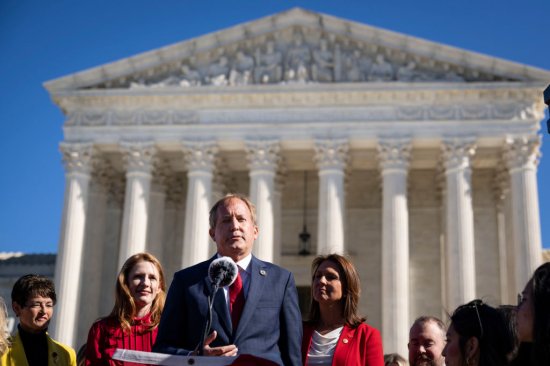
What the ruling means.
Texas hospitals cannot be required to perform emergency abortions to stabilize the life of a patient, a federal appeals court ruled, despite federal guidance to the contrary.
The 5th U.S. Circuit Court of Appeals ruled in favor of Texas Attorney General Ken Paxton, along with the American Association of Pro-Life Obstetricians & Gynecologists and Christian Medical and Dental Associations. The judges wrote in their opinion that the Biden Administration’s guidance—which says hospitals receiving Medicare must provide abortions if they were a necessary medically stabilizing treatment—oversteps its authority and runs counter to state laws.
[time-brightcove not-tgx=”true”]Circuit court decisions can be appealed and either party can petition the U.S. Supreme Court to take up the case. The Justice Department declined to comment in an email to TIME on Wednesday.
The ruling means that the status quo remains in Texas, which bans abortions except for narrow exceptions when the pregnant patient is “at risk of death or poses a serious risk of substantial impairment of a major bodily function.” The state is the largest in the country to enact restrictive abortion laws in the wake of the U.S. Supreme Court’s 2022 Dobbs v. Jackson Women’s Health Organization decision, overturning the Roe v. Wade ruling which guaranteed abortion access nationwide.
Alliance Defending Freedom’s Senior Vice President of Strategic Initiatives Ryan Bangert, who argued before the court on behalf of the two medical groups, said in a statement that “hospitals—especially emergency rooms—are tasked with preserving life. The 5th Circuit correctly ruled that the federal government has no business transforming them into abortion clinics.”
More From TIME
Senior Staff Attorney Rabia Muqaddam of the Center for Reproductive Rights, which is representing plaintiffs in other Texas abortion cases, tells TIME in an emailed statement Wednesday that the ruling “shows a complete disregard for the lives of pregnant people.”
Texas is at the forefront of abortion litigation as the legal landscape around the procedure continues to evolve. Tuesday’s ruling continues to leave medical providers in Texas to decipher the state’s law and determine whether an abortion is medically necessary to save a patient, at the risk of criminal repercussions. Paxton had threatened to criminally prosecute doctors and hospitals if they provided an abortion to a plaintiff in another high-profile legal case. Texas woman Kate Cox petitioned state courts to allow her to terminate her pregnancy because of a condition that gave her fetus very low chances for survival, but after legal whiplash between different courts, she left the state to receive an abortion just before the Texas Supreme Court denied her case. Center for Reproductive Rights spokesperson Kelly Krause tells TIME in an email that “the exceptions are incredibly unclear and doctors are terrified to rely on these vague exceptions when they could face life in prison.”
In another ongoing Texas case, 20 women who were denied abortions sued the state over its near total abortion ban. Attorneys delivered oral arguments before the Texas Supreme Court in November and are awaiting a ruling.
The state’s top court suggested last year that the Texas Medical Board issue guidance to doctors on abortion law, but the medical board punted back to the legislature to specify. The legislature did clarify in a follow-up law that doctors can abort in cases of two specific life-threatening pregnancy conditions.
After Dobbs, the U.S. Department of Health and Human Services and Centers for Medicare and Medicaid Services issued its own guidance that said hospitals must provide an abortion if it is a stabilizing treatment necessary to resolve an emergency medical condition, in line with their obligations under the Emergency Medical Treatment and Active Labor Act of 1986.
After Texas and anti-abortion groups sued, a U.S. Justice Department attorney argued before the court in November that the guidance provided needed safeguards and ruling against it was an error with “potentially devastating consequences for pregnant women within the state of Texas,” the Associated Press reported.
Muqaddam says that the appeals court’s interpretation was a “radical narrowing” of the law that means everyone who comes into an emergency room in Texas is entitled to stabilizing care––“unless they happen to be a pregnant person who needs an emergency abortion to be stabilized.”